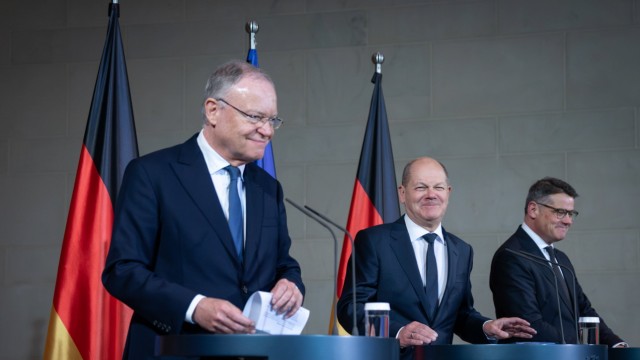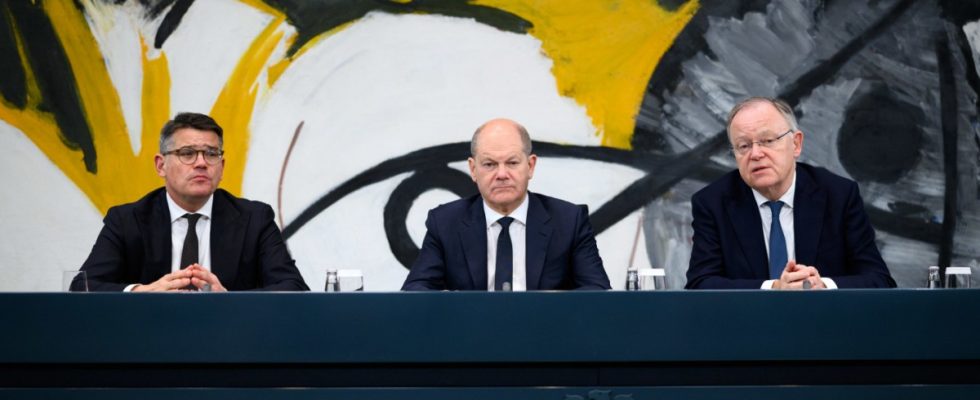It was another long day in Berlin. The prime ministers of the federal states negotiated for almost 17 hours, first among themselves and then with Chancellor Olaf Scholz (SPD). They struggled to reach compromises until 2:30 a.m. The most important decisions at a glance.
migration
Since the beginning of 2022, around 1.5 million people have come to Germany and around 1,000 more travel into the country illegally every day. Scholz and the Prime Minister want to reduce this “irregular migration” and speed up asylum procedures. This is intended to relieve the burden on municipalities in particular, but also take the wind out of the AfD’s sails.
The biggest point of contention in the negotiations was money. The states and municipalities had greater federal involvement in the Refugee costs and demands an annual per capita flat rate of 10,500 euros in addition to the 1.25 billion euros already promised for 2024. They ultimately agreed with Scholz on 7,500 euros. In the words of the Chancellor, this “breathing system” means for the states: “When the numbers go up, there is more money, and when the numbers go down, there is less.”
The federal and state governments want to save costs and at the same time reduce possible incentives Cuts in benefits for asylum seekers. In the future, they should no longer receive so-called analogue benefits after 18 months, but only after 36 months, the amount of which corresponds to the citizen’s benefit. They often receive benefits in kind beforehand. According to the resolution paper, the per capita flat rate and the adjustments to benefits should lead to relief for states and municipalities of around 3.5 billion euros next year – based on this year’s migration figures.
In the Federal Chancellery, Prime Minister Scholz and the Prime Ministers negotiated from early evening until late into the night.
(Photo: Kay Nietfeld/dpa)
The federal and state governments also want to reduce incentives by restricting cash payments to benefit recipients and introducing a payment card for this purpose. This is intended to prevent migrants from sending money to their home countries.
Scholz and the prime ministers also agreed that the Controls at the borders with Poland, the Czech Republic, Austria and Switzerland, which actually expire in mid-November, will be maintained in order to combat smuggling.
There is a surprise when asked Asylum procedures outside the European Union. Chancellor Scholz had viewed this with skepticism in the past few days, but apparently gave up his restraint during the summit. The federal government now wants to check whether the protection status of refugees can also be determined in transit or third countries in the future. The Geneva Refugee Convention and the European Convention on Human Rights should be respected. It is still unclear which countries are eligible.
The theory behind the idea: The mere prospect of a trial in a completely different country, for example in Africa, should deter migrants from making the dangerous flight across the Mediterranean and on to Germany. In their coalition agreement, the SPD, Greens and FDP had already agreed to examine such an approach “in exceptional cases”. This test is still ongoing.
In general, the federal and state governments want to be involved Asylum procedure become faster: If refugees come from countries with a low recognition rate of less than five percent, the group aims to complete asylum and subsequent court proceedings within three months. If people come from other countries, it should not take longer than six months. That would be a lot faster than before. In some federal states, the actual duration of the procedure is currently around three years.
The Family reunification will not be expanded, as the traffic light actually wanted to do according to the coalition agreement. However, the resolution paper does not mention any restrictions, as the states had requested.
Those who are already here and have legally secure prospects of remaining want the federal and state governments to move more quickly put into work. They see this as the best way “for greater acceptance and faster integration” and also point to the labor shortage in Germany.
Planning acceleration
One point that could almost be lost in public perception given the dispute over migration and finances is the agreement on a “pact for accelerating planning, approval and implementation”. What sounds cumbersome is intended to ensure that things move faster in the bureaucratic country of Germany in the future, for example in the construction of wind turbines, power lines, railway lines and apartments.
Politicians want to focus particularly on procedural law. Participants such as citizens and environmental associations should be involved earlier and more digitally, complex approval procedures In some projects, it can be simplified or even omitted entirely. In addition, individual process steps should run more often in parallel and deadlines should be shortened. In appropriate cases, applications should be viewed as approved after the deadline has expired, even if the authority has not yet made a decision on it.

When the summit was far from over, Chancellor Olaf Scholz and the Prime Ministers of Lower Saxony, Stephan Weil, and Hesse, Boris Rhein, appeared in front of the press to announce their agreement on accelerating planning.
(Photo: IMAGO/Political-Moments)
Construction projects have often been delayed due to environmental regulations. In the future, reports and environmental data should be recorded in digital databases and can be used in comparable cases. At the Species protection The federal and state governments want to introduce uniform standards in the areas of rail, energy infrastructure, roads and industrial facilities. Environmental groups are skeptical: They warn that standards that have been laboriously achieved could be undermined.
When expanding the energy infrastructure, the federal government wants to Restrict the rights of property owners. In exchange for compensation, they should have to tolerate their property being used to lay lines that connect renewable energy systems to the general power grid. In order to speed up the planning and approval of railway lines, the basic assumption that there is an overriding public interest should be enshrined in law when expanding, building new and replacing rail infrastructure.
Germany ticket
The federal and state governments have agreed on the Germany ticket small steps towards financing agreed. Both sides want to continue the project and inject 1.5 billion euros each in 2024 to compensate for loss of income for the transport companies. The federal government does not give the commitment required by the states to bear half of the costs beyond this, as in 2023. Instead, the Chancellor and Prime Minister agreed to use funds not used this year for 2024. You want to avoid having to inject additional funds.
The transport ministers should be commissioned to present a concept for implementing the ticket from next year. It cannot be ruled out that the ticket price will be increased from the current 49 euros.

